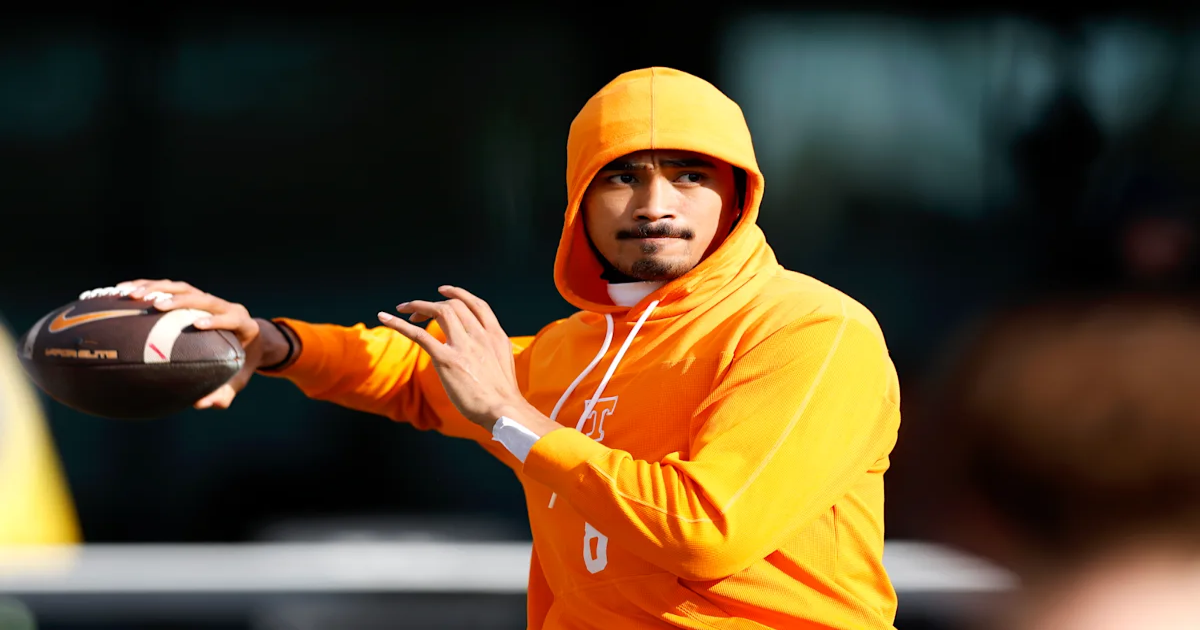We’ll start this college football column with a video game analogy, and not an analogy to EA Sports’ College Football game. No, for this column, we look to the legendary Grand Theft Auto franchise for inspiration.
A key element of Grand Theft Auto is, unsurprisingly, driving a wide range of high-powered and extraordinarily fast vehicles, from sports cars to motorcycles to planes to … you get the idea. Anyway, what’s the first thing you do when you get behind the wheel of a car in Grand Theft Auto? Do you sensibly obey every virtual traffic light or respectfully merge into the flow of traffic?
Advertisement
Advertisement
Hell, no. Gifted with awesome power, you floor it. You might pass a hundred virtual cars at blinding speed, and you might drive right into the side of a virtual building, but either way, you’re not letting that vast power go to waste.
You see where we’re going with this. In the NIL and transfer portal era, college football players now have vast power. (They weren’t given that power. A century of officially unpaid predecessors earned it for them.) Some are using that power responsibly, working the system to amass wealth that was unthinkable (legally) even half a decade ago.
Others, well … others are driving their newly profitable college careers right off a cliff.
When the book — or, more likely, the six-part Netflix documentary — is crafted about college football’s NIL era, the Nico Iamaleava saga will be a key inflection point. A talented, still-growing quarterback, a multimillion-dollar guarantee, a program very much on the upslope … all of it now blasted to orange-and-white confetti because of overreach and misplaced faith.
Advertisement
Advertisement
At this point, all we know are facts — not motivations — but the facts are enough to sketch out the parameters of the full picture. Iamaleava had earned a $2 million annual deal from Tennessee, but Iamaleava (or, perhaps, his team of advisers) decided that wasn’t enough money.
It’s important to point out that there’s nothing wrong with Iamaleava simply wanting more money. Everyone who’s ever drawn a paycheck has wanted that paycheck to be a little larger. It doesn’t make you ungrateful, it makes you human. And when you draw a paycheck for a profession that could end with one hit or twist, well, you might feel even more pressure than, say, someone sitting behind a desk would to increase that paycheck to the maximum possible.
Nico Iamaleava helped lead Tennessee to the College Football Playoff last season, where the Vols lost in the first round to eventual national champion Ohio State. (Photo by Robin Alam/ISI Photos/Getty Images)
(Robin Alam/ISI Photos via Getty Images)
The problem for Iamaleava — and where the “cautionary tale” element of this whole saga comes into play — is that his (or, again, his advisers’) idea of a “maximum possible” paycheck way overshot what Tennessee was willing to pay. Team Iamaleava overplayed their hand, overestimating their value or underestimating Tennessee’s willingness to fire back with a we-don’t-negotiate counterstrike.
Advertisement
Advertisement
So where does this leave Iamaleava? Facing a whole lot of potential downgrades. To start, there’s the simple math of the situation. Iamaleava reportedly wanted $4 million from Tennessee, which was already paying him $2 million. That’s a $2 million raise for Tennessee … but a $4 million hit for any other program.
Plus, if he has aims on continuing his football career, well, he just fumbled away the starting job in a program that sent its past two pre-Nico starters (Hendon Hooker, Joe Milton III) to the NFL. If he goes to a school in the Big Ten — he’s reportedly heading to UCLA — it’s unlikely he’ll find one with the same talent level he had at Tennessee, and he obviously won’t have the same familiarity with players or staff.
If, as reports Wednesday suggest, Iamaleava is headed to UCLA, he’ll be trading a marquee-level SEC program for one that finished 5-7 overall and 3-6 last season in the Big Ten, a College Football Playoff program that has made just two bowls — the L.A. and the Sun — in the past seven years. It’s a substantial downgrade by any measure.
It’s also worth noting the team representing Iamaleava did him no favors — and in fact may be responsible for this entire mess in the first place. An “anonymous family friend” told Front Office Sports on Wednesday that Iamaleava wasn’t seeking more money, but that seems at odds with the fact that Tennessee wouldn’t cut ties with him for no reason whatsoever. Regardless, the Iamaleava story should be a bright red warning flag for any college player: Get quality representation, and don’t put your career in the hands of people who clearly haven’t thought through every possible outcome … even the worst one.
Advertisement
Advertisement
Someone will pay Iamaleava, and pay him well; he’s got the talent to lead a team at college football’s highest level. But he may have just torpedoed his long-term career path — or, at the very least, made it that much more long and winding than it would have been coming from a playoff-level SEC school.
Again, there’s nothing illicit about Iamaleava hopping school-to-school in search of a bigger bag; that’s what the system permits now. But when money’s all you’re after, you start to foreclose on the elements that lead to the larger picture — development as a quarterback, harmony with your team, reputation as a reliable leader — with every bounce. And unlike in a video game, in college football there’s only so many times you can hit reset.
